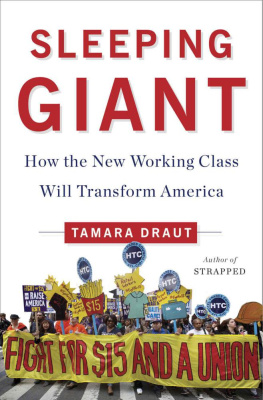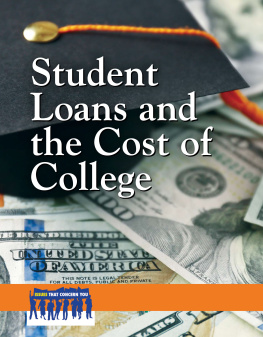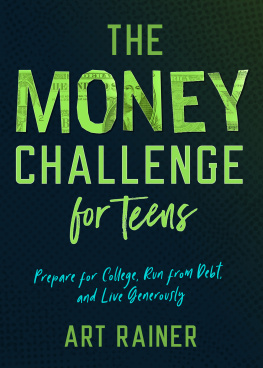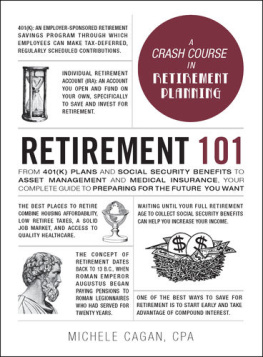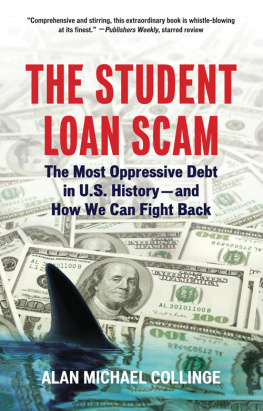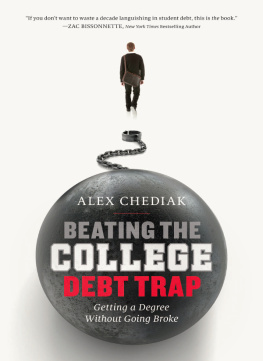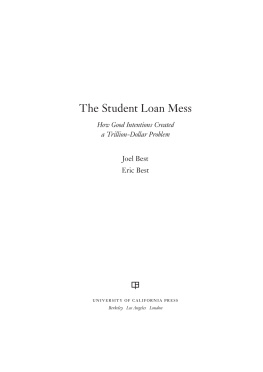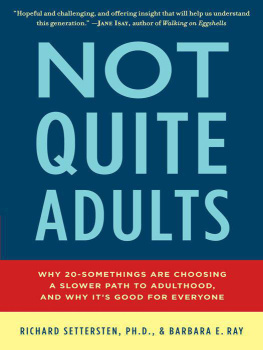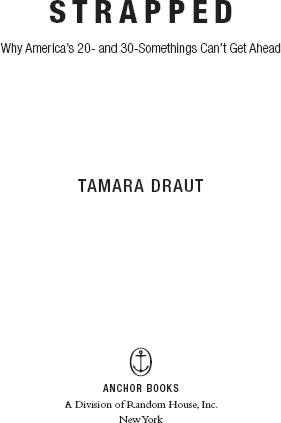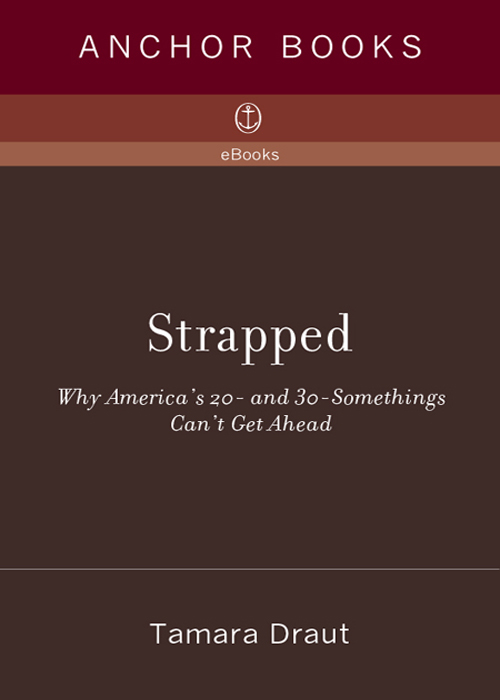
Contents
For Stuart
Introduction
T hey say music feeds the soul. When youre flat broke, it can also feed your stomach. Several years ago, my husband and I found ourselves sitting in the middle of our living-room floor, our entire CD collection spread out before us. We had not a dollar between us and payday was three long days away. It wasnt the first time wed been strapped for cash, but we never imagined wed be peddling our wares for food money at the age of 30.
By the time of our CD purge, becoming adults had left us with $57,000 in student loan debt and $19,000 in credit card debt.
We were so far behind in fulfilling our own expectations, our parents expectations, and societys expectations, we didnt know whether to laugh or cry. We werent clothes hounds, we didnt take vacations, and we seldom went out to dinner. Most of our economic woes could be traced back to eight years of start-up costs (pots, sheets, a bed), flights for family visits and friends weddings, unstable incomes from shoestring salaries, three bouts of unemployment, a gig at graduate school, and one major career change.
And we werent alone. When we talked to people our age from all walks of life, it became clear that we werent the only ones who were strapped. While my husband and I were dismantling our CD collection to make some cold hard cash, other young adults were facing tougher decisions and making bigger sacrifices. Across the country, young adults of different cultural, social, and economic backgrounds were confronting brick walls on their path to adulthood.
Cecilia graduated from a California high school in 1999. It was the height of the tech boom and many of her classmates were dreaming of fast money and early retirement. Cecilia had a different dream: this second-generation Latina wanted to go to college and become a teacher. Despite a good grade-point average and athletic awards in several sports, Cecilia didnt earn the much-needed scholarship money to pay for school. So she did what millions of graduating seniors do each year: she applied for financial aid. But her working-class parents earned too much money to qualify her for aid, yet not enough to afford the state university where Cecilia was accepted. And so with her heart still set on becoming a teacher, she enrolled in the local community college, worked part-time, and lived at home to save money. Three years later, Cecilia has her associates degree and is working at the mall. She still wants to be a teacher. She still wants to be the first person in her family to graduate from college.
Rob and Laura, a white couple now in their mid-thirties, are further along in their journey to adulthood. When they first got married, they thought they were on sound financial footing. Though neither finished college, Rob became trained as a heating and air-conditioning technician while Laura got a job working in the accounts-receivable department at the local plastics plant. They made $50,000 between them, which enabled them to live comfortably, but not extravagantly. When Laura became pregnant with their first child, Robs parents gave them the down payment to buy a house. Their first child turned out to be twinsand, overnight, comfortable became very uncomfortable. Without the option of affordable child care, Laura had little choice but to quit her job and take care of the twins. Just then her husbands business took a dive. With their savings dwindling, credit cards went from occasional aids to lifelines. Today, the couple have three young children and $40,000 in credit card debt. They never dreamed that starting a family would plunge them into such deep financial and emotional straits.
Wanda and Jerome seem like the quintessential middle-class African American couple who have captured the American dream. Both aged thirty-two, they are a dynamic duo with multiple college degrees. Wanda has a masters in human relations and Jerome has an M.B.A. Getting these credentials also got them $30,000 in student loan debt. Thankfully the couple resides in Montgomery, Alabama, where the cost of living is low. But with a five-month-old baby, a six-year-old son, and a twelve-year-old daughter, this family of five is living paycheck to paycheck. They are unable to afford child care, so Wandas mother has been living with them for five months, and they dont know what theyll do when she leaves. After Jerome was laid off from his account-manager position at a Fortune 100 company, they ran up a couple of thousand dollars in credit card debt. His layoff was an especially bitter pill, since it was this job that brought them to Alabama in the first place. They would like to move out of Montgomery because the educational system is poor, but right now theyre biding their time and trying to pay down their debts.
The lives of Cecilia, Rob and Laura, and Wanda and Jerome are at once strikingly different and fundamentally similar. Three different backgrounds. Three different classes. Three different life experiences. They did all the right things, but theyre all struggling to make ends meet. And theyre not alone. All across the country young adults are sinking economically. The question is, why?
Behind each of these individual stories is a broader tale of economic and political changes that have occurred over the last three decades. For our parents, who grew up during the 1950s and early 1960s, establishing oneself as an adult was a fairly straightforward process. Moving out of your parents house, getting a job, and starting a familythe three major markers of adulthoodunfolded in a rather swift and orderly fashion. There was little time between graduation, landing a well-paying job, getting married, and having kids. But in the late 1960s, the baby boomers, then in their twenties, began charting a different course to adulthood. Driven by social, economic, and political forces, young adults began delaying definitive adult behaviors such as getting married and having kids. As college and career opportunities expanded for women and minorities, more young adults began going to college instead of directly into the labor market after high school. The transition to adulthood was becoming less rigid and more ill defined. A generation later, these trends became more exacerbated. The path to adulthood for todays young adults is a full-blown obstacle course of loop-de-loop turns and jagged-edged hurdles.
When our parents were starting out, three factors helped smooth the transition to adulthood. The first was the fact that there were jobs that provided good wages even for high school graduates. A college degree wasnt necessary to earn a decent living. But even if you wanted to go to college, it wasnt that expensive and grants were widely available. The second was a robust economy that lifted all boats, with productivity gains shared by workers and CEOs alike. The result was a massive growth of the middle class, which provided security and stability for families. Third, a range of public policies helped facilitate this economic mobility and opportunity: a strong minimum wage, grants for low-income students to go to college, a generous unemployment insurance system, major incentives for home ownership, and a solid safety net for those falling on hard times. Simply put, government had your back.
This world no longer exists. The story of what happened is well known. The nation shifted to a service- and knowledge-based economy, dramatically changing the way we lived and worked. Relationships between employers and employees became more tenuous as corporations faced global competitors and quarterly bottom-line pressures from Wall Street. Increasingly, benefits such as health care and pension plans were provided only to well-paid workers. Wages rose quickly for educated workers and declined for those with only high school diplomas, resulting in new demands for college credentials. As most families saw their incomes stagnate or decline, they increasingly needed two full-time incomes just to stay afloat, which created new demands and pressures on working parents. Getting into the middle class now required a four-year college degree, and even that was no guarantee of achieving the American dream.
Next page

